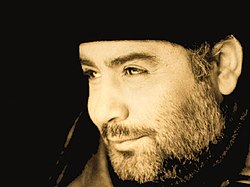Ahmet Kaya
| Ahmet Kaya | |
|---|---|
 |
|
| Background information | |
| Born | 28 October 1957 Malatya, Turkey |
| Died | 16 November 2000 (aged 43) Paris, France |
| Genres | Turkish music, Kurdish music, Azerbaijani music |
| Occupation(s) | Musician, poet |
| Instruments | Bağlama, Singing |
| Years active | 1985–2000 |
| Website | www.ahmetkaya.com |
Ahmet Kaya (28 October 1957 – 16 November 2000) was a Turkish-Kurdish singer from Malatya, Turkey. He identified himself as a Kurd of Turkey. Some of his most popular songs include Ayrılık Vakti, Söyle, Ağladıkça, Oy Benim Canım, Birazdan Kudurur Deniz, Arka Mahalle, Kum Gibi, Nereden Bileceksiniz, Hani Benim Gençliğim, Yakarım Geceleri and Şafak Türküsü.
Ahmet Kaya was the fifth and last child born to his father, a Kurd who had moved from Semsûr to Meletî. He first encountered music at the age of six. Ahmet Kaya worked for a while as a taxicab driver in Istanbul before becoming well known as a singer in the mid-1980s.
His first album, Ağlama Bebeğim, was released in 1985. His popularity continued to rise into the 1990s when in 1994 he released the album Şarkılarım Dağlara which sold a record copies. All of his 1990 albums became chart-toppers.
During his career he recorded approximately 20 albums and was known for his protest music and positions on social justice. Recurring themes in his songs are love towards one's mother, sacrifice, and hope.
On 10 February 1999 during the televised annual music awards ceremony, SHOW TV, at which he was to be named Musician of the Year, Kaya spoke out about his Kurdish background and said that he wanted to produce music in his native Kurdish as naturally as he did in Turkish. He announced that he had recorded a song in Kurdish (Karwan, released on the Hoşçakalın Gözüm album in 2001) and intended to produce a video to accompany it.
Following this announcement, he faced massive opposition from Turkish people and celebrities, led by Serdar Ortaç, who years later apologized for his behavior, and the crowd also started singing a Turkish nationalist song. Kaya's wife told the BBC that "All of a sudden, all of those chic women and men, they all turned into monsters, grabbing forks and knives and throwing them at us, insulting, booing. Imagine the atmosphere changing in just five minutes, almost a Kafkaesque transformation." This was an incident which led to a prosecution case which made him leave Turkey.
Kaya went to France in June 1999, escaping various charges arising from his political views.. In March 2000 he was sentenced in absentia to three years and nine months in prison on the charge of spreading separatist propaganda. Later, however, the visual media central to allegations demonstrating Kaya in front of the poster was proven to be forged. He died from a heart attack in Paris in 2000, at the age of 43, and is buried in Père Lachaise Cemetery.
...
Wikipedia
